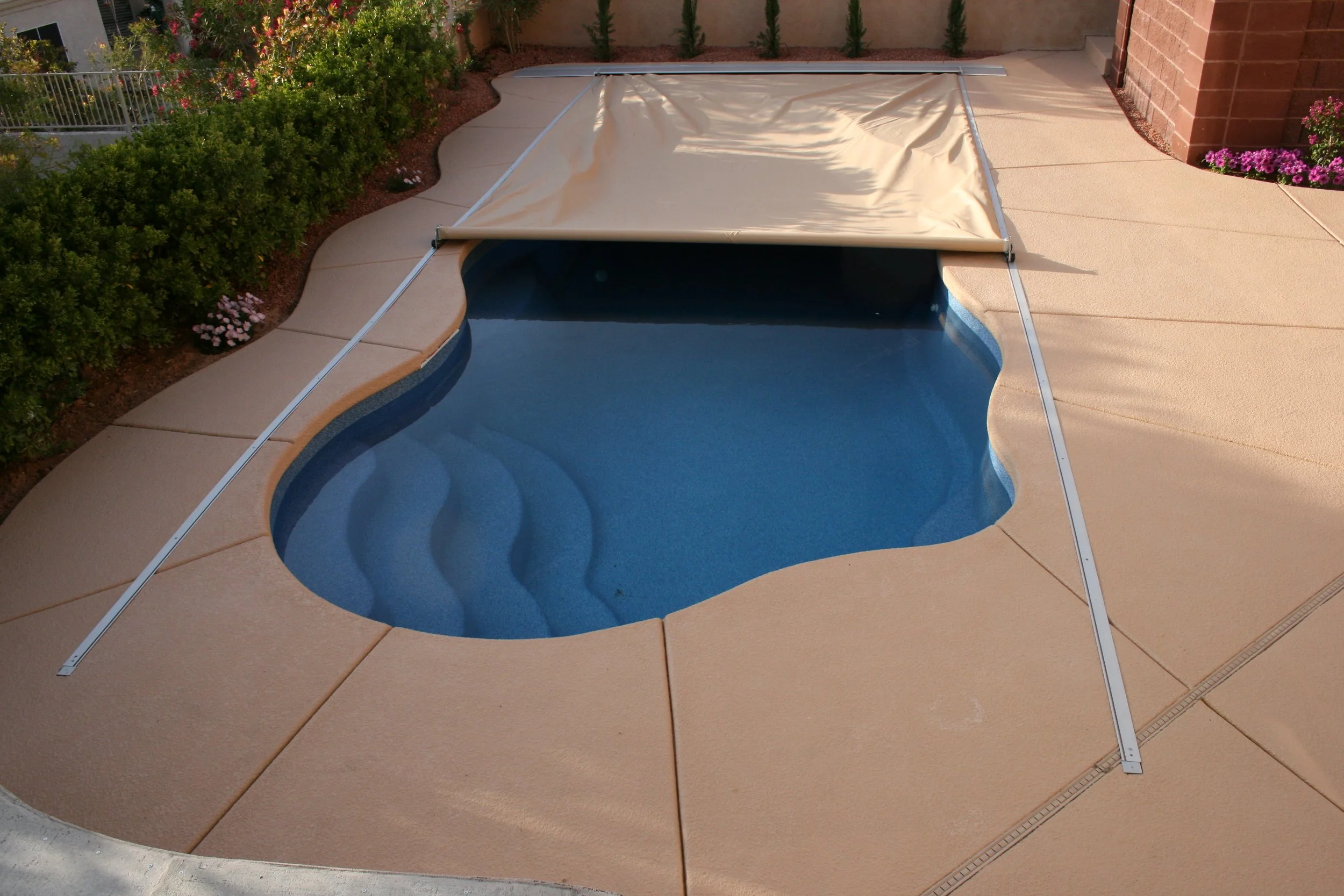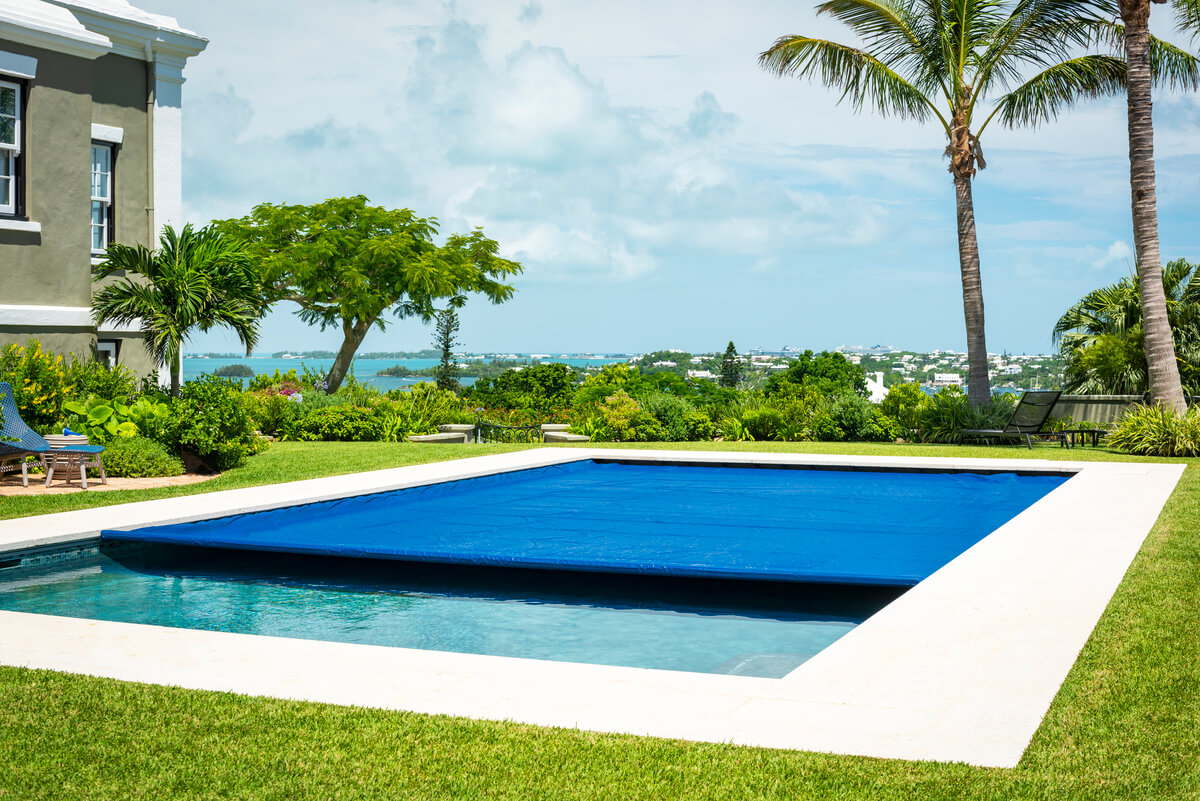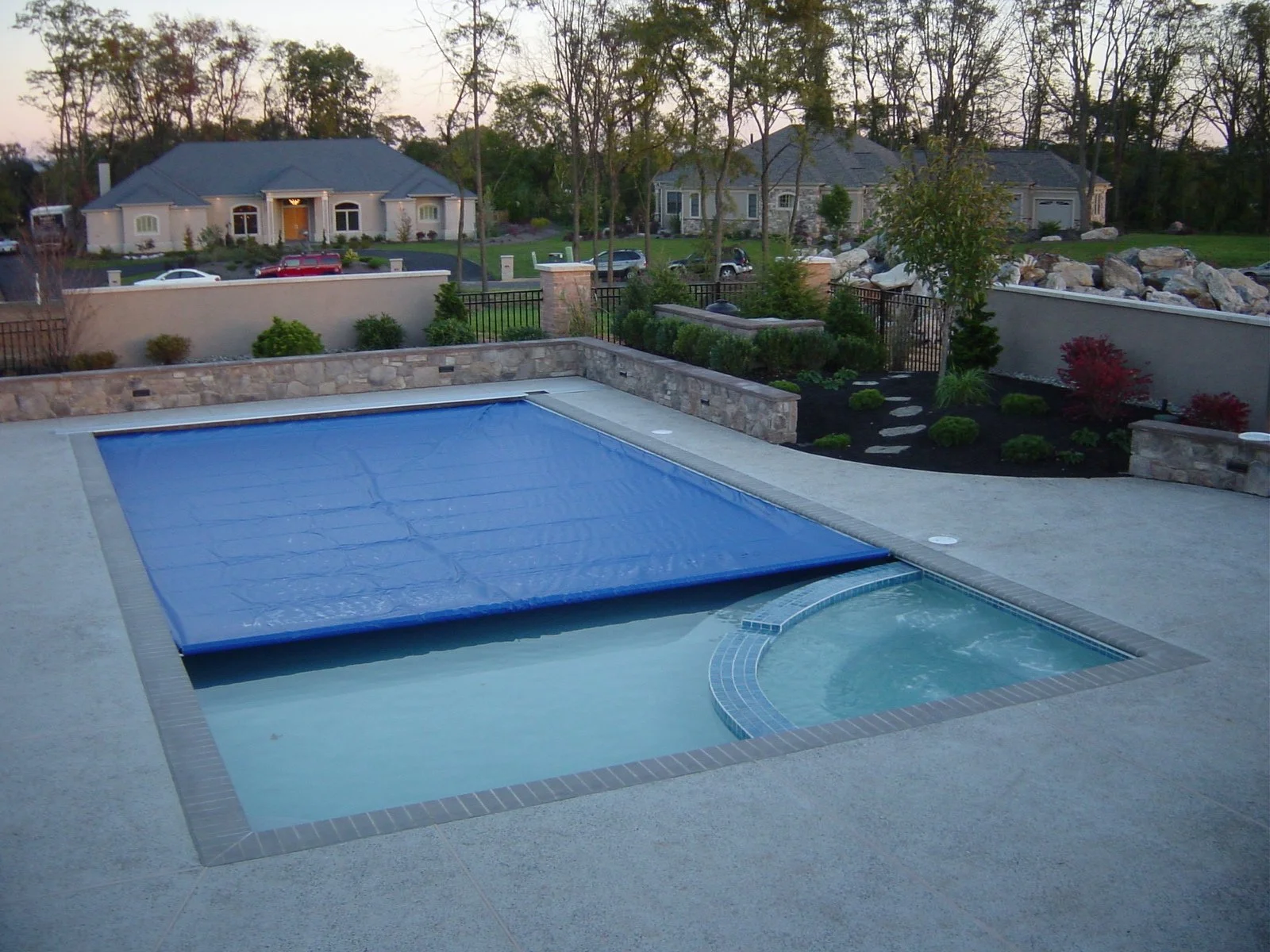When it comes to creating your dream backyard oasis, choosing the right type of pool is a crucial decision. Each pool construction method offers unique benefits and considerations, allowing homeowners to tailor their choice to their specific preferences, budget, and lifestyle. In this blog, we’ll delve into three popular pool options: gunite, fiberglass, and vinyl liner pools.
Gunite Pool
A gunite pool is a type of swimming pool that is constructed using a process called gunite. Gunite is a mixture of cement, sand, and water, which is pneumatically sprayed onto a steel or wire frame structure to create the pool shell. The mixture is typically applied using a high-pressure hose, allowing it to adhere to the framework and form a solid and durable structure.
The term “gunite” is often used interchangeably with “shotcrete,” although there is a slight difference between the two. Shotcrete is a similar process but involves a wet mix of concrete that is sprayed onto the framework. Gunite, on the other hand, involves a dry mix of concrete and sand that is mixed with water at the nozzle just before it is sprayed.
Gunite pools are popular because they offer a high degree of flexibility in design and shape. The sprayed-on concrete allows for the creation of custom shapes, curves, and features, making it possible to create unique and visually appealing pool designs. Gunite pools are also known for their strength and durability, as the sprayed concrete forms a solid and structurally sound shell.
After the gunite is applied, it is typically covered with a waterproof finish, such as plaster or a pool liner, to provide a smooth and comfortable surface for swimmers. The pool can then be further customized with various features, including tile work, steps, benches, and waterfalls.
Overall, gunite pools are a popular choice for homeowners who are looking for a highly customizable and long-lasting swimming pool option.
Pros of Gunite Pools:
-
Customizable design: Gunite pools allow for a high degree of design flexibility, making it possible to create unique shapes, curves, and features that cater to individual preferences and landscape characteristics.
-
Durability and strength: Gunite pools are known for their strength and durability. The sprayed-on concrete forms a solid and long-lasting shell that can withstand the test of time and resist damage from external forces.
-
Versatility: Gunite pools offer versatility in terms of finishes and customization options. They can be further enhanced with various features such as tile work, steps, benches, waterfalls, and other aesthetic elements.
Cons of Gunite Pools:
-
Longer construction time: Building a gunite pool typically takes longer compared to other pool types. The process involves excavation, constructing the steel or wire framework, spraying the gunite, and allowing time for curing and finishing, which can extend the overall construction timeline.
-
Higher cost: Gunite pools tend to have a higher upfront cost compared to other pool types due to the labor-intensive construction process and the materials involved.
-
Regular maintenance required: Gunite pools require regular maintenance to preserve their appearance and structural integrity. This includes periodic resurfacing, cleaning, and maintaining proper water chemistry. Failing to properly maintain the pool can lead to issues such as cracks, stains, or deterioration of the finish.
Fiberglass Pool
A fiberglass pool is a type of swimming pool that is constructed using a pre-formed fiberglass shell. The pool shell is manufactured off-site and then transported to the installation location, where it is placed in an excavated hole or on a prepared base.
Fiberglass pools are made from a composite material consisting of fiberglass strands and resin. The manufacturing process involves layering the fiberglass strands in a mold and then applying resin to bind them together. This process creates a strong, durable, and watertight pool shell.
One of the advantages of fiberglass pools is their relatively quick installation time. Since the pool shell is pre-formed and delivered as a single piece, it can be installed in a matter of days, compared to the longer construction times required for gunite or concrete pools. Additionally, the smooth and non-porous surface of fiberglass pools is resistant to algae and stains, reducing the need for extensive maintenance.
Fiberglass pools come in a variety of shapes, sizes, and designs, offering homeowners a range of options to choose from. Some manufacturers also offer customization options, such as built-in steps, benches, and tanning ledges.
It’s worth noting that while fiberglass pools offer several benefits, they may have limitations in terms of design flexibility. Since the pool shell is pre-formed, customization options are more limited compared to gunite pools. Additionally, transporting the large fiberglass shell to the installation site may require access for heavy machinery or may have limitations based on the site’s accessibility.
Overall, fiberglass pools are a popular choice for homeowners who value quick installation, low maintenance, and a durable pool structure.

-
Quick installation: Fiberglass pools are typically quicker to install compared to gunite or vinyl liner pools. Since the pool shell is pre-formed and delivered as a single piece, it can be installed in a shorter timeframe, allowing homeowners to enjoy their pool sooner.
-
Low maintenance: The smooth and non-porous surface of fiberglass pools is resistant to algae and stains, reducing the need for
-
extensive maintenance. This can save homeowners time and money on cleaning and chemical treatments.
-
Durability and longevity: Fiberglass pools are known for their durability and longevity. The fiberglass shell is resistant to cracking, fading, and degradation from sunlight or chemicals, making it a long-lasting option for pool owners.
Cons of Fiberglass Pools:
-
Limited customization: Unlike gunite pools, fiberglass pools have limitations when it comes to customization. Since the pool shell is pre-formed, the design options are more restricted, and it may not be possible to create unique or complex shapes.
-
Transportation limitations: Transporting the large and bulky fiberglass shell to the installation site may require access for heavy machinery or may have limitations based on the site’s accessibility. This should be considered when evaluating the feasibility of installing a fiberglass pool.
-
Upfront cost: Fiberglass pools tend to have a higher upfront cost compared to vinyl liner pools, although they are often less expensive than gunite pools. The cost of the pool shell, transportation, and installation should be factored into the budget when considering a fiberglass pool.
Vinyl Liner
A vinyl liner pool is a type of swimming pool that has a custom-made vinyl liner as the interior surface. Unlike gunite or fiberglass pools, which have a permanent shell, vinyl liner pools have a structure made of metal, wood, or polymer panels, often referred to as the pool walls. The vinyl liner is then installed inside this framework, creating the pool’s water-retaining surface.
The construction process of a vinyl liner pool typically involves excavating the pool area and assembling the pool walls. These walls are typically made of panels that are connected to form the shape of the pool. Once the pool walls are in place, a sand or concrete base is prepared, and the vinyl liner is carefully fitted into the pool structure.
The vinyl liner itself is a flexible, watertight material that is specifically manufactured for swimming pools. It is available in a wide range of colors and patterns, allowing homeowners to choose the look that suits their preferences. The liner is secured around the top edge of the pool walls using a coping strip or track, which holds it in place and provides a finished appearance.
One advantage of vinyl liner pools is their affordability compared to other types of pools. They tend to have a lower upfront cost because the materials used are generally less expensive than those used in gunite or fiberglass pools. Additionally, the smooth surface of a vinyl liner pool is comfortable to the touch and less prone to scratches or abrasions.
However, it’s important to note that vinyl liners can be susceptible to tears or punctures if sharp objects come into contact with them. Over time, the vinyl liner may also require replacement due to wear and tear. The lifespan of a vinyl liner can vary depending on factors such as maintenance, water chemistry, and usage.
In summary, a vinyl liner pool is a cost-effective option that provides a customizable and comfortable swimming experience. It offers a wide variety of design options, but it should be maintained properly to ensure its longevity and prevent any issues with the vinyl liner.
Pros of Vinyl Liner Pools:
-
Lower upfront cost: Vinyl liner pools generally have a lower initial cost compared to gunite or fiberglass pools, making them a more affordable option for homeowners on a budget.
-
Smooth and comfortable surface: The vinyl liner provides a smooth and non-porous surface that is comfortable to touch and walk on. It is also less prone to scratches or abrasions, providing a pleasant swimming experience.
-
Design options: Vinyl liner pools offer a wide variety of design options in terms of color, pattern, and texture. Homeowners can choose from a range of options to create a customized look that suits their aesthetic preferences.
Cons of Vinyl Liner Pools:
-
Lifespan and replacement: Vinyl liners have a limited lifespan and typically require replacement every 7 to 15 years, depending on factors such as maintenance, water chemistry, and usage. This additional cost should be considered when evaluating the long-term expenses of a vinyl liner pool.
-
Vulnerable to damage: While vinyl liners are relatively durable, they are more susceptible to tears, punctures, or damage from sharp objects compared to other pool surfaces such as gunite or fiberglass. Care should be taken to prevent any potential damage that could lead to leaks or the need for repairs.
-
Limited customization: Unlike gunite pools, vinyl liner pools have limitations in terms of customization. The shape and design options are more restricted due to the nature of the vinyl liner being fitted into a pre-existing structure. This may limit the ability to create unique or complex pool designs.
Pool Shapes
Freeform Pool
A freeform pool is a type of swimming pool that does not have a standard geometric shape such as rectangular or oval. Instead, it is designed with organic and flowing lines that mimic natural bodies of water like ponds or lakes. Freeform pools often have curves, irregular shapes, and a more naturalistic appearance compared to traditional geometric pools.
The design of a freeform pool allows for a more creative and customized approach, as it can be tailored to fit the landscape and surroundings of a property. It offers flexibility in terms of size, shape, and features. The goal is to create a pool that blends harmoniously with the natural environment, incorporating elements such as rock formations, waterfalls, and landscaping to enhance the overall aesthetic.
Freeform pools can be constructed using different materials, such as gunite, fiberglass, or vinyl liners, depending on the homeowner’s preferences and budget. The choice of construction material does not define a freeform pool, as the term refers primarily to the shape and design.
One of the advantages of a freeform pool is its ability to create a visually appealing and unique backyard oasis. The organic shapes and natural elements contribute to a more relaxed and inviting atmosphere. Freeform pools are often preferred in properties with lush landscapes, gardens, or irregularly shaped outdoor spaces.
It’s important to note that the construction of a freeform pool may be more complex and require skilled professionals to ensure proper design and installation. The irregular shape and features of the pool may also affect maintenance and cleaning processes, as there may be more nooks and crannies that require attention.
In summary, a freeform pool is a type of swimming pool that deviates from the traditional geometric shapes, offering a more natural and artistic design. It provides homeowners with the opportunity to create a unique and visually striking pool that complements the surrounding landscape.
Rectangle Pool
A rectangle pool, as the name suggests, is a type of swimming pool that has a simple rectangular shape. It is one of the most common and traditional pool designs, characterized by straight sides and 90-degree angles at the corners.
The rectangular shape of the pool offers several advantages. First, it maximizes the available space, allowing for efficient use of the pool area. The straight sides of a rectangle pool also make it easier to install pool covers, safety barriers, and other accessories. Additionally, the consistent depth of a rectangular pool can make it suitable for a variety of activities, from swimming laps to playing water games.
Rectangle pools are often preferred for their clean and classic aesthetic. They provide a timeless look that can complement different architectural styles and landscaping designs. The simplicity of the shape also makes it easier to incorporate additional features such as diving boards, steps, and benches.
Furthermore, the straightforward design of a rectangle pool can simplify the construction process. It typically involves digging a rectangular hole, forming the pool walls, and installing the pool equipment and finishes. The predictable shape of the pool allows for efficient use of construction materials and facilitates the installation of plumbing and filtration systems.
However, it’s worth noting that the rectangular shape may not suit every backyard or landscape. Some homeowners may prefer a more unique or naturalistic design, which can be achieved with freeform or custom-shaped pools. Additionally, rectangular pools may lack the visual interest or organic feel of other pool designs.
In summary, a rectangle pool is a traditional and popular swimming pool design characterized by a simple rectangular shape. It offers practicality, a classic aesthetic, and versatility for various activities. However, personal preferences and the specific characteristics of a property should be considered when choosing the ideal pool shape.
Conclusion
As we conclude our exploration of gunite, fiberglass, and vinyl liner pools, it’s clear that each option brings its own set of advantages and considerations. Gunite pools offer unparalleled design flexibility and long-lasting durability, allowing you to create a truly customized swimming experience. Fiberglass pools impress with their quick installation and low maintenance requirements, perfect for those seeking convenience and ease of use. Vinyl liner pools provide an affordable option for homeowners looking for customization options and a comfortable swimming surface.
Ultimately, the choice of pool type depends on your individual preferences, budget, and the specific characteristics of your property. Consider factors such as desired design, maintenance requirements, longevity, and initial cost to make the best decision for your dream backyard oasis.
Remember, it’s always beneficial to consult with pool professionals who can provide expert advice and guide you through the selection process. They can help you assess your needs, evaluate your options, and ensure a smooth installation.
No matter which pool type you choose, the joy and relaxation that come with owning a swimming pool are bound to elevate your outdoor living experience. So, go ahead and make a splash with the pool that suits your style, and get ready to create unforgettable memories in your very own aquatic haven.
Happy swimming!








